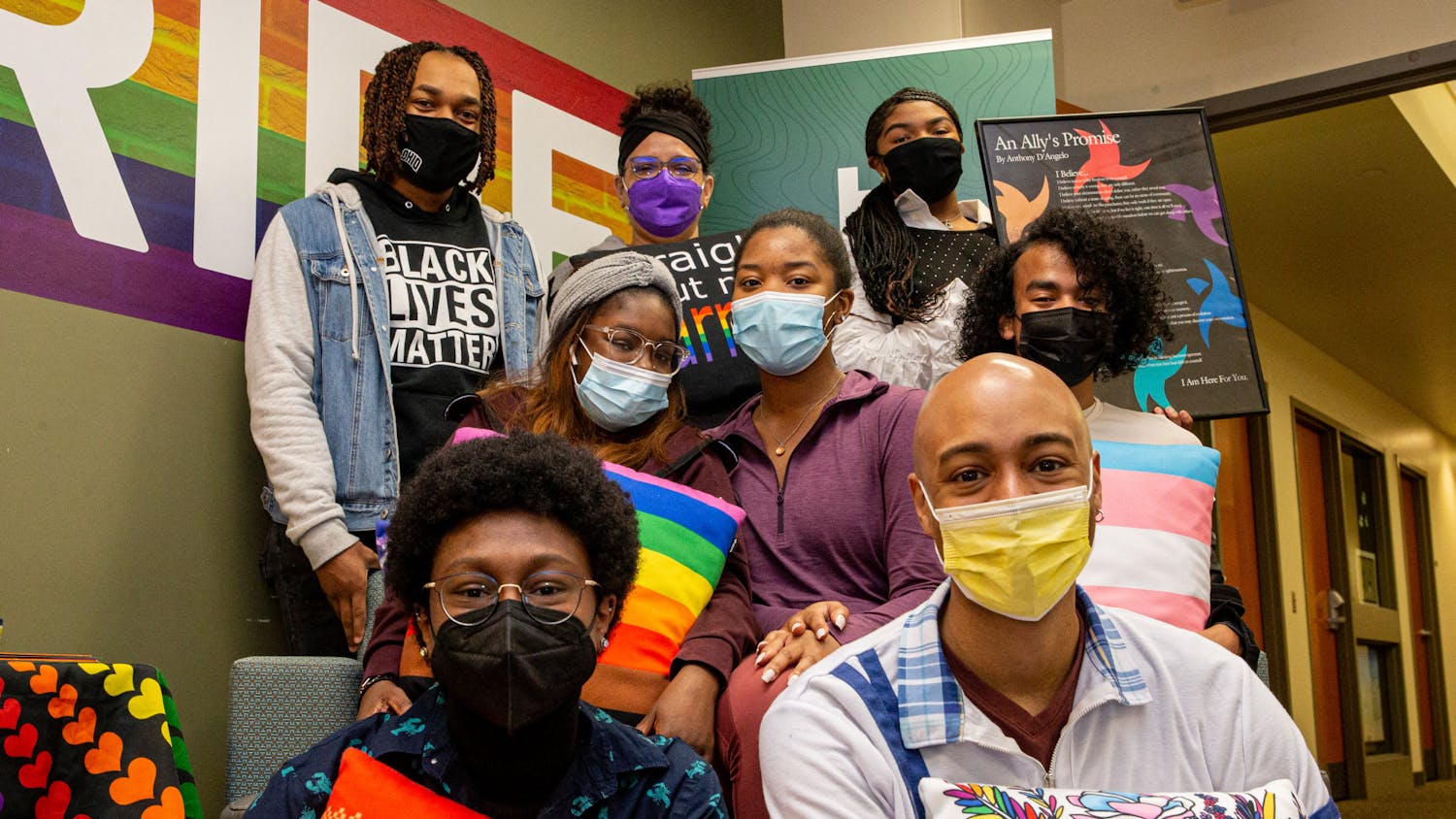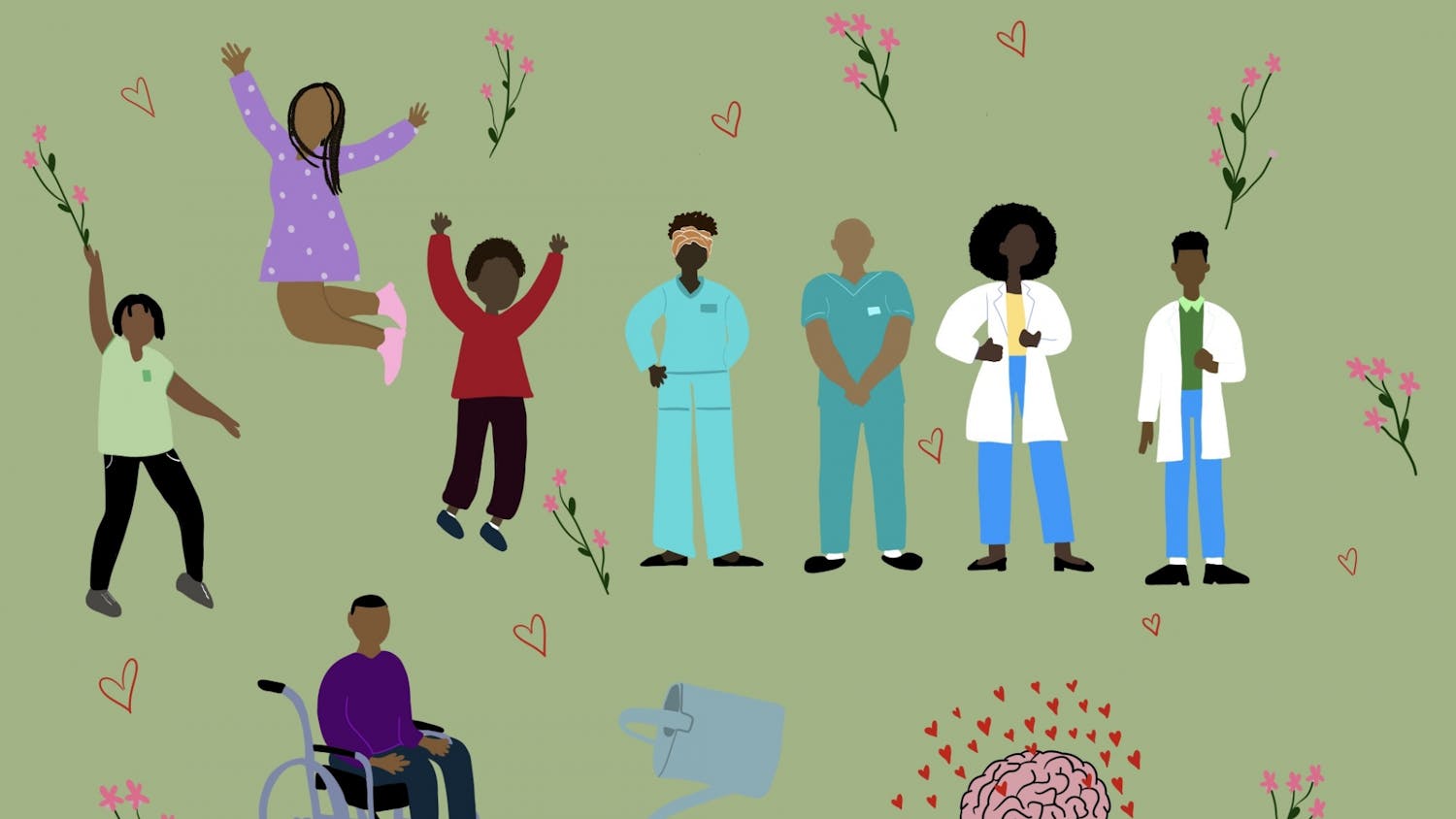Harnessed up and tied in, climbers ambitiously maneuvered as high as they could. The rock climbing wall at Ping Center was not scaled by seasoned climbers, however, but by girls trying something new.
From 5 p.m. until 7 p.m. on Wednesday, the wall was closed for a private event: Black Girls Rock Climb.
One climber who took on the wall was Dianna Johnson-Ward, a well-being support manager for the Office of Health Promotion, which helped to plan and host the event. She felt rock climbing was a good way to collaborate with colleagues at Outdoor Pursuits and to introduce students to different ways to get active on campus.
“It's not just lifting weights and running on the treadmill,” Johnson-Ward said. “I know, for a lot of people, that can be daunting and annoying and tedious. I come from the field of exercise; I still don't always want to exercise. So, I thought this would be a fun way to get the girls active and to expose them to maybe something that they didn't usually do.”
She said rock climbing is an extension of a larger initiative, Change Our Outcomes, that’s dedicated to promoting physical activity for Black women on campus. The program works to serve Black women who face representative, cultural and practical barriers in the fitness world.
During warmer weather months, the initiative provided weekly walking groups, with one each day of the week. As the weather changed, however, these walks became logistically more difficult, so Johnson-Ward began seeking out other options to encourage physical activity.
She said she has been trying to prioritize group fitness activities in planning, like a previous boxing class activity and a plan for group yoga.
Daisha Hogan, a sophomore studying nursing, came to the event after someone sent her the flyer in a group chat. She said she’d wanted to rock climb before and thought it was a cool opportunity.
“It's definitely a challenging experience, and it was more analytic than I thought it would be,” Hogan said of the climb. “But it's definitely a new thing that I'm willing to try again.”
Getting students to try again is Johnson-Ward’s goal. She has a background in exercise and public health and ran track in college. This passion for exercise and her work as a public health professional inspired her to create the program.
“When we look at the demographics and we break it down for physical activity, which obviously we know is one of the things that can negate obesity, we see that Black women are getting the least amount of physical activity,” Johnson-Ward said. “It kind of starts at puberty and it expands. It just goes across the lifespan that we end up very sedentary and not living active lives.”
According to the CDC, Black American women have an obesity rate of 56.9% in those over 20, compared to just 37.5% of Black men and 35.5% of white women. While size is not a standard of health, Johnson-Ward said this can contribute to chronic illnesses, many of which can be combated or prevented by routine fitness.
Johnson-Ward said part of why this pattern is prevalent is because fitness representation is limited for Black women. Fitness is often male-dominated, and when women are represented online or in group activity, they tend to be white. In fact, in a study of 232 fitness magazines featuring women as cover models, only 44, or just 19%, featured non-white women.
Johnson-Ward said her representation was also limited in what she saw growing up.
“You don't see that kind of behavior modeled in the home, so (it’s) kind of generational,” Johnson-Ward said. “I know my mom has gone to the gym since I've been alive, but I ain’t never seen her there. So, you don't see that behavior in the home, so then you don't model it.”
Practically, exercise can be difficult for Black women as well. Johnson-Ward spoke of the politicization of Black women’s hair in the context of discriminatory policies that deem natural hair unprofessional. However, when Black women straighten their hair, sweating can cause it to revert back to its natural state.
The Black hair industry is worth over $1 trillion and rising, and in a town with limited hair care options for Black hair, many students are forced to travel to get their hair done. Johnson-Ward said potentially discarding that money and time for a workout can be unappealing.
“Our hair, despite it being such a beautiful thing and such a way for us to express ourselves, it is often very politicized, critiqued when we wear it in our natural state,” Johnson-Ward said. “With exercise, that sometimes can affect the hairstyles that we choose, or I have naturally curly hair and when it’s straight and I start to sweat it starts to revert back. Well, theoretically, that's not super presentable for work, unfortunately. It is to me: I think I have beautiful hair. But, you think about, ‘Oh, I just got my hair done. I don't want to go sweat at the gym,’ which might not be a big deal to another group of women, but we spend a lot of money on our hair.”
Beauty standards can also be a factor, Johnson-Ward said, especially as working out can often be seen as intended to shape one’s body more than contribute to their health. While the white western standard of beauty tends to favor thin bodies, she said she sees Black beauty standards typically encourage curvier body types.
“You see women gain weight after pregnancy and things like that,” Johnson-Ward said. “They're less apt to lose the weight because they're like, ‘Oh, I got hips now. I got thighs now,’ and you have that more curvy thing and that look overshadows, maybe, the need to be healthy. Because we do see that when women hold on to that postpartum weight that it leads to other things. But that's not something that they're thinking about because it's more body image, body type, a more ideal, curvy body type.”
Johnson-Ward described herself as athletically-built, and although she said growing older has helped her not to care what others think or say about her appearance, she has faced pressure to change her body.
“There's kind of that stigma of having a womanly body,” Johnson-Ward said. “Because I'm not curvy, I'm relatively flat-chested, so it's like I don't have the body of a woman despite the fact that I'm almost 30 years old. But that's more of a cultural thing. I don't think that you see that in other cultures as much as like your womanhood being tied so closely with your body and body type.”
This pressure can lead to health complications, and Johnson-Ward said she has even tried to gain weight to fit the standard, although she noted her professional training allowed her to do so in a healthy way. Unfortunately, many women do not have that same training and seek out unhealthy practices. A 2009 study found Black women are 50% more likely than white women to engage in bulimic behavior.
“Black women suffer with disordered eating and things like that just as much as white women, but we're not the face of that issue because it's almost the reverse — the overeating and things like that,” Johnson-Ward said. “When you talk about disordered eating and eating disorders, that's not really what people are thinking about. They're thinking about deprivation, but we have it the other way.”
Johnson-Ward also hosts a podcast, “Our Space,“ on which she discusses health and wellness. While anyone is encouraged to listen and educate themselves, the podcast is tailored for a Black female audience.
Overall, Johnson-Ward just hopes to increase interaction and involvement with resources like Ping for Black women. She said at a predominantly white institution, it can be difficult to connect with other students sharing your experience. She hosts monthly events, and information for each can be found through the Change Our Outcomes newsletter, which are open to any Black women on campus.
“Change Our Outcomes is rooted in physical activity, but I’m finding that it has become such a social thing,” Johnson-Ward said. “I’m just really hoping that the girls show up and that they meet each other.”
Editor-in-Chief






